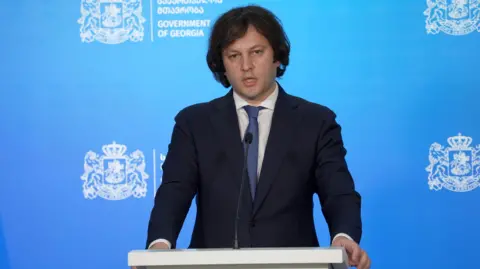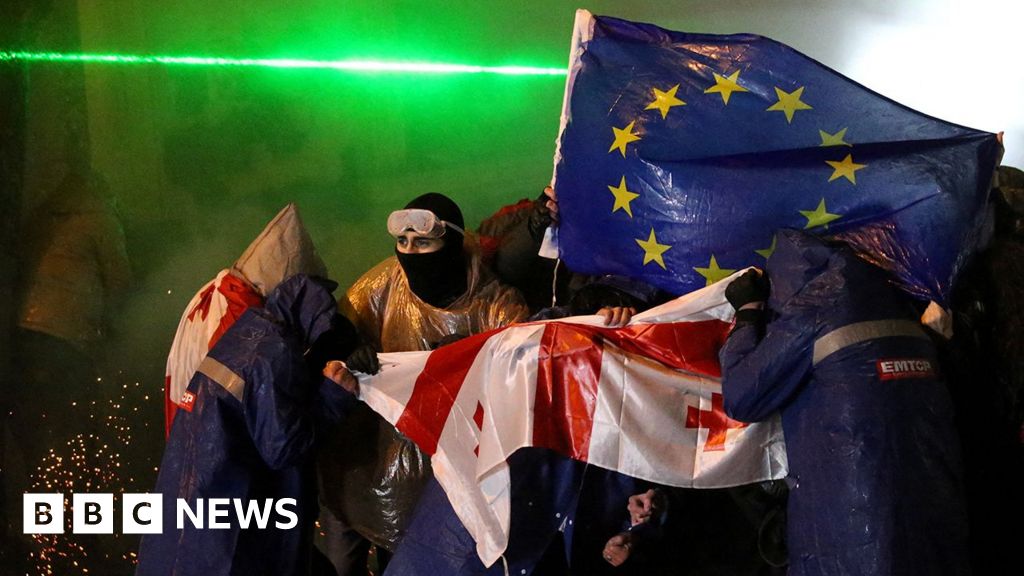Georgia has seen a fourth night of street demonstrations and a string of public resignations, triggered by the ruling party’s decision to suspend its push to start negotiations to join the European Union.
As tens of thousands of Georgians returned to the streets of several cities, Prime Minister Irakli Kobakhidze said he had fallen victim to the opposition’s lies and rejected calls for new elections.
He confirmed reports that Georgia’s ambassador to the US, David Zalkaliani, was the latest senior diplomat to step down, explaining that he was under a lot of pressure.
But Kobakhidze tried to deny the reason for the protest, saying on Sunday “we have not suspended anything, this is a lie”.
Just three days ago, his party Georgian Dream accused EU accession talks of “blackmail” and said the government had decided not to put the issue on the agenda until the end of 2028.
Pro-EU protesters turned out in large numbers again on Sunday night, and when firecrackers were aimed at the parliament building and riot police, police responded with water cannons.
Large groups of riot police swarmed the streets next to parliament, and the protests on the main Rustaveli Avenue were dispersed earlier on Monday.
As protesters fled the area, several people were arrested, including Zurab Zaparidze, one of the leaders of the opposition Alliance for Change.
 Georgi Arjevanidze/AFP
Georgi Arjevanidze/AFPGeorgia’s increasingly authoritarian government has been accused by the EU and the US of democratic backsliding. On Saturday, the US took the significant step of suspending its strategic partnership with Georgia.
Kobakhidze insisted that the Georgian Dream is still “committed to European integration … and we are continuing on our path to the European Dream.”
And yet a growing number of public officials don’t seem to believe that’s true. Several ambassadors have resigned and hundreds of civil servants and more than 3,000 teachers have signed letters condemning the decision to withhold EU accession.
 Anton Chicherov/BBC
Anton Chicherov/BBCMany Georgians were shocked by the level of violence directed at Georgian journalists and protesters. Dozens of reporters were beaten or pepper-sprayed and some required hospital treatment.
Georgia’s human rights ombudsman Levan Ioseliani said “this is brutality” and he pleaded with the police not to abuse their powers.
The prime minister said it was the opposition groups, not the police, who faced “systematic violence”.
Natalie Sabanadze, Georgia’s former ambassador to the EU, now based in the UK’s Chatham House, believes the level of violence, string of resignations and civil disobedience signal a “qualitative change” to the ongoing protests.
“Maybe (the government) thought people would panic, but it’s not working this way,” he told the BBC. “Yesterday civil society activists and artists went to the public broadcaster, took it over and forced it to live stream. I saw this before in pre-revolutionary Georgia (in 2003).”
Georgia’s pro-Western president, Salome Zourabichvili, is due to step down in a few weeks, but after last month’s contested parliamentary elections denounced as rigging by opposition parties, she has remained a powerful figure, rallying protesters against the government and calling for A new vote.
Even though the majority of the population supports joining the EU, they and protesters accuse the government of aiming to drag their country back into Russia’s sphere of influence.
Georgia has a population of about 3.7 million and 20% of its territory is under Russian military occupation in two divided regions.
During the day on Sunday, a small group of protesters occupied the traffic intersection in front of Tbilisi State University.
“I am here for the future of my country and for the future of my three-year-old son,” said 29-year-old protester Salome. “I don’t want him to spend his life in protests and I don’t want. the Russian government.”
While Georgian Dream flatly denies any links to the Kremlin, in the past year it has adopted Russian-style laws that target civil society groups with funding from abroad and LGBT rights.
Half an hour away from the daylight protests, a small army was trying to clean graffiti from the front wall of Georgia’s parliament.
Some of the building’s windows were smashed on Saturday night and an effigy of Bidzina Ivanishvili, the billionaire seen as the driving force behind the Georgian Dream’s 12-year rule, was burnt.
The question now is what will happen next in Georgia’s deep political and constitutional crisis.
The Georgian Dream government’s relations with its Western partners have been badly damaged.
The EU’s new foreign policy chief, Kaja Kallas, warned on Sunday that the government’s actions “will have direct consequences on the EU side” and that the US decision to suspend its strategic partnership will be widely felt.
Georgia’s prime minister had little time for the president or called for new elections.
“Ms. Salome Zourabichvili has four Fridays left (as president) and she can’t use it. I understand her emotional state, but she has to leave on December 29.”







